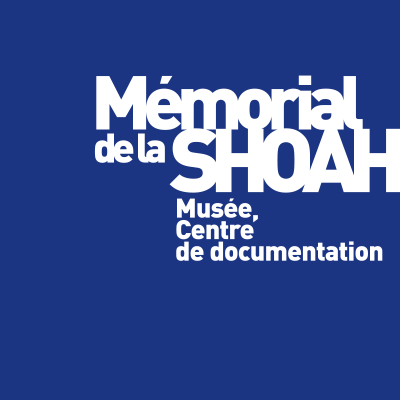The services of the Shoah Memorial
The educational activities
The educational service is one of the mediation tools of the Memorial. In connection with schools, the teaching service team carries out various awareness and education actions. It organizes guided tours, hosts classes at the Memorial and offers workshops to young people all year round.
Contact: reservation.groupes@memorialdelashoah.org
The documentation center
The documentation centre offers the public and researchers a set of unique textual, iconographic and audiovisual resources. It includes the photo library (more than 280,000 photographs), the library (some 50,000 references), the archives (more than 30 million items) and the multimedia teaching center. Two members of the archives department are dedicated to welcoming families in the Names room.
Contacts:
documentation@memorialdelashoah.org
archives@memorialdelashoah.org
phototheque@memorialdelashoah.org
bibliotheque@memorialdelashoah.org
Search for people / Document a compensation file: noms@memorialdelashoah.org
The training
In connection with the pedagogical service and the service of development of places of memory, the training service offers throughout the year activities designed for professional audiences, teaching, police and justice as well as for students. Two summer universities, in Paris and Poland, and a winter university in Israel complete the training offer of the Memorial.
Contact: formations@memorialdelashoah.org
Cultural activities
The cultural activities department is in charge of programming and organizing events at the auditorium, as well as temporary exhibitions at the Memorial but also outside the walls, in France and abroad. The cultural activities service also includes the multimedia teaching center and the bookstore.
Contacts:
programmation@memorialdelashoah.org
librairie@memorialdelashoah.org
international relations
The Shoah Memorial, at the international level, notably aims to impact memory policies in high-stakes European states such as the Western Balkans, the Baltic countries, Ukraine, and to include the Shoah in a reflection open to genocides by prioritizing regional issues. It develops structured partnerships with local ministries of national education, the French diplomatic and cultural network, associations of history teachers or NGOs involved in memorial issues. Training seminars, research workshops, conferences or exhibitions are in most cases offered abroad with the support of international donors. Finally, the widening of the geographical scope to Africa led the Memorial, at the request of UNESCO, to organize training sessions to support the Cameroonian authorities, Central African and Congolese in their desire to introduce the teaching of the Shoah and genocides as peace education.
Learn more
Contact: relationsinternationales@memorialdelashoah.org
Development and visits to places of memory in France and abroad
The Development and Visits of Memorial Sites service offers support and expertise in the development of memorial sites. He is particularly involved in projects to safeguard and develop former internment camps, such as the Camp des Milles or the internment camps in Loiret. This service is also in charge of organizing trips to places of remembrance, particularly at the Auschwitz-Birkenau site in Poland.
Contacts:
lieux@memorialdelashoah.org
inscription@memorialdelashoah.org
SPEAKING GROUP
The Shoah Memorial hosts one Sunday per month, a meeting of a speaking group of former children hidden during the Holocaust. This discussion group is led by the psychologists of the Georges-Devereux Centre, with the support of the Fondation pour la Mémoire de la Shoah.
Next appointments: on Sundays, October 13, 2024, November 17, 2024, December 8, 2024 from 2:30 PM to 5:00 PM (Free, without reservation)
Information:
Georges-Devereux Center
Tel.: 01 77 32 10 64 or by email: accueil@devereux.fr
Review of the history of the Shoah/ Publications
Created in 1946 under the name of Le Monde juif, the world’s first magazine specialized on the Shoah became in 1997 the Revue d'histoire de la Shoah. This biannual publication is a scientific tool, but also a place for exchange and reflection between researchers and witnesses from all over the world. The team of the journal also publishes, in co-edition with Calmann-Lévy, the works of the collection Mémorial de la Shoah.
Contact: rhs@memorialdelashoah.org
Communication
The objective of the communication service is to give the Mémorial de la Shoah the best visibility among the general public in France, where the cultural offer is particularly dense, but also internationally.
In addition, the communication service sets up media and institutional partnerships. He is also in charge of the creation and dissemination of all internal and external communication tools for the Memorial.
Contacts : communication@memorialdelashoah.org
